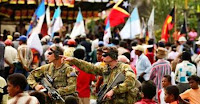This story comes from Reuters journalist Ahmad Pathoni. It highlights of one of many challenges facing East Timor:
 Outgoing President Xanana Gusmao is one who understands the difficulty of the East Timor's language dilemna. He favours Portuguese - but speaks Bahasa and English.
Outgoing President Xanana Gusmao is one who understands the difficulty of the East Timor's language dilemna. He favours Portuguese - but speaks Bahasa and English.Dili, East Timor - Portuguese is one of the two official languages in East Timor, but you can hardly hear it spoken in the streets of the young nation.
The tiny country was a Portuguese colony for more than three centuries, but only an estimated 5% of its one million people now speak the European language.
After Lisbon cut the territory free, East Timor was occupied by neighboring Indonesia for 24 years before gaining full independence in 2002.
Under Indonesian rule, Portuguese was suppressed and speakers of the language now mostly come from the political elite or are older people educated in the colonial era.
Despite government attempts to push the use of Portuguese as an official language, Indonesian remains the main language of instruction in secondary schools and universities, along with native Tetum, the other national language.
Many of East Timor's leaders left for exile in Portugal or its colonies before or soon after the territory was invaded by Indonesian forces and many of them do not speak Indonesian.
They consider Portuguese to be the language of resistance.
But the government's decision to enshrine Portuguese in the Constitution is criticized by some, who see it as short-sighted.
They say many young people educated under Indonesian rule have been denied state jobs because they lack Portuguese skills.
"This is the biggest type of discrimination practiced by the government," said Suzanna Cardoso, a Timorese journalist.
"The government does not recognize the contribution of those educated under the Indonesian system to the struggle for independence," she told Reuters.
Cardoso said English would be more useful for East Timor.
"Why do we have to use Portuguese? Portuguese-speaking countries are poor and they are far from us," she said.
Jumble of languages
Tetum is used in daily interaction but some experts say it is mainly a spoken language and has to be developed further for wider usage.
But the issue is sensitive and a Cabinet minister has been criticised for only speaking Portuguese and never using Tetum in public.
Signboards at government offices are written in Portuguese, although for most Timorese it remains a foreign language they don't understand.
Newspapers run articles in Tetum and Indonesian side-by-side. Indonesian TV soap operas are also hugely popular.
"I don't know any Portuguese. I'd rather learn English than Portuguese," said Ano Pereira, a driver and high school graduate.
The language issue was raised by some of the eight candidates contesting April 9 presidential elections, with one promising to ditch Portuguese if he won the presidency.
News conferences during the elections were held in four languages -- English, Tetum, Portuguese and Indonesian -- adding to the difficulty of coordinating the fairly chaotic polls.
No candidate in the election won a big enough majority to win outright and a run-off is expected to be held next month.
At the National University of East Timor, teachers give lectures and students write their theses in Indonesian.
"Most of our textbooks are in Indonesian and most lecturers don't speak Portuguese," management student Julio Rangel said as he sat at the hallway of a white-painted campus building, a Catholic seminary during colonial times.
A report released by the United Nations Development Programme in 2002 said 82% of East Timor's one million populations spoke Tetum, while 43% could speak Indonesian.
Only 5% spoke Portuguese.
The government, dominated by the Fretilin party that spearheaded the struggle against Indonesian rule, has brought in teachers mostly from Portugal to teach in elementary schools.
However, there are concerns that once pupils finish elementary education, they will have to enroll at a secondary school where teachers don't speak Portuguese.
"This is going to be a big problem. These students don't speak Indonesian and their teachers don't know Portuguese," said Julio Thomas Pinto, who teaches at two universities in the East Timor capital Dili.
The head of East Timor's National Institute of Linguistics, Dr Geoffrey Hull, defends the adoption of Portuguese as a national language.
"Anyone with the slightest familiarity with East Timor's history knows that the Portuguese language has long been central to the national identity," he said on the institute's website.
"East Timor needs both Tetum and Portuguese to be fully itself," he said.
But Silvino Pinto Cabral, an economics lecturer at the national university, is not convinced.
"This policy of imposing a foreign language will not work. I doubt that in 50 years the government will be able to make the whole nation proficient in Portuguese," he said.























![[SGE.BNV36.090507103724.photo00.quicklook.default-245x167.jpg]](https://blogger.googleusercontent.com/img/b/R29vZ2xl/AVvXsEiC6fgagYtpnYNnjxd3rNQwfrclmt3jby_pbSMokeXJDHpmrEXJBgkfTVP1G9MHD75RMJdDnzCZohPOpU-UfGYkaTJHozVPDvAED3tqVbt2suYrWD5DRN_UNO1CCDHG1lGxDnzu/s1600/SGE.BNV36.090507103724.photo00.quicklook.default-245x167.jpg)










